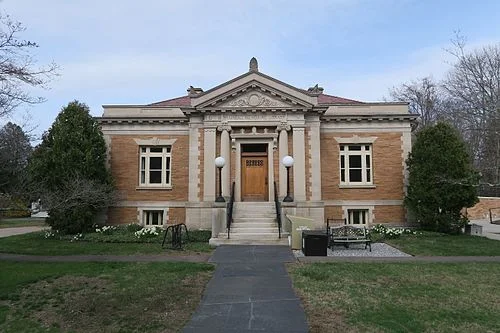Chris Powell: Using trivia to rile up voters
Brainerd Memorial Library, in Haddam, Conn. Haddam is in south-central Connecticut, in the lower Connecticut River Valley and home of Cockaponset State Forest. Incorporated in October 1668 as Hadham, It was later renamed Haddam because of people saying Hadham too fast.
Haddam is the only town in Connecticut divided by the Connecticut River, by far New England's biggest river. It contains five villages – Hidden Lake, Higganum, Shailerville and Tylerville on the west side of the river, and Haddam Neck on the east. For its first 200 years, the river was a major source of the town's livelihood and, of course, transportation. Today, Haddam is almost entirely a residential community.
Connecticut's politicians seem determined to vindicate H.L. Mencken, who observed a hundred years ago: "The whole aim of practical politics is to keep the populace alarmed (and hence clamorous to be led to safety) by an endless series of hobgoblins, most of them imaginary."
A round of hobgoblining was triggered two weeks ago at a meeting of Haddam's Board of Selectmen, when Selectwoman Melissa Schlag, a Democrat, knelt during the Pledge of Allegiance to protest President Trump. Schlag had been protesting this way for some time without wrecking the country or the flag. Indeed, she had been doing it without being noticed outside Haddam at all.
But the episode two weeks ago was noticed on local cable television and was quickly turned into a national sensation by two Connecticut Republican primary candidates -- Tim Herbst, running for governor, and Art Linares, state senator from the Haddam district, running for treasurer.
Herbst and Linares called a rally in Haddam, supposedly to defend the flag but actually to boost their campaigns by riling people up over an issue having no connection to the offices they seek. Thus they gave Schlag's protest far more publicity than she had gotten on her own.
The rally coincided with another Haddam selectmen's meeting, which was attended by hundreds of people who sought to criticize if not intimidate Schlag and who recited the pledge as loudly as they could. Schlag knelt again but this time placed her hand over her heart, perhaps now perceiving that the pledge is not to the president but to the country and that using it politically may give offense.
While many in the audience rebuked Schlag, some still acknowledged her right to protest as she did and some supported her outright. The confrontation managed to stay above the brawling of the aspiring Nazis and Communists elsewhere in Weimar America.
But Schlag still had to trample on the remnant of civility. As the meeting ended cell phone video caught her remarking that her town is "fascist and racist" even though she had been allowed to continue her protest and race never figured in the controversy. She ended up revealing herself as another looney leftist, her self-promoting and self-righteous stunt having been trumped by a bigger stunt by far more accomplished and self-righteous self-promoters.
Then some Connecticut Democrats took their turn at hobgoblining, jumping on the federal lawsuit seeking to suppress publication of blueprints for plastic guns made by three-dimensional printers, called "ghost" guns because they carry no identification marks and don't activate metal detectors.
Not just Connecticut's two U.S. senators but the two contenders for the Democratic nomination for governor, Ned Lamont and Joe Ganim, and even a candidate for the party's nomination for treasurer, Shawn Wooden, called for outlawing such guns.
But only federal law can have much effect on items potentially in commerce like these, and so state law and state officials are virtually irrelevant here.
Of course Connecticut and the country have a serious gun-violence problem, but it is not guns themselves as much as the worsening of poverty on top of drug prohibition. Democrats seem to think that if they can scare voters with "ghost" guns, they might not have to address their failure with poverty policy.
Chris Powell is a columnist for the Journal Inquirer, in Manchester, Conn.

